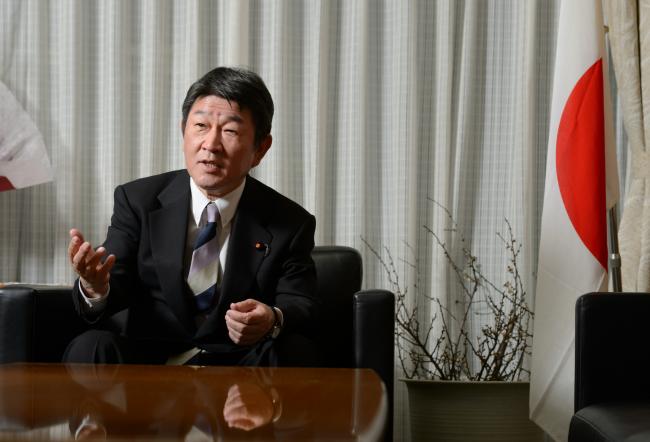(Bloomberg) -- Japan is sticking to its view that the U.S. won’t apply higher tariffs on imports of Japanese cars and auto parts so long as negotiations toward a trade deal continue, according to Tokyo’s lead negotiator with Washington.
The comments from economy minister Toshimitsu Motegi come as policy makers in Japan and Europe fret about the findings of a U.S. Commerce Department report on vehicle imports submitted to Donald Trump on Sunday.
Trump has threatened to raise U.S. tariffs on car and auto part imports as high as 25 percent if they are deemed a U.S. security risk. Higher tariffs would wallop Japan’s biggest industry, severely denting the country’s growth prospects. Car and auto part exports made up 20 percent of Japan’s total exports in 2018.
Motegi said Tuesday he had previously confirmed with U.S. Trade Representative Robert Lighthizer that Washington wouldn’t apply higher rates amid talks on a trade deal. Prime Minister Shinzo Abe had also confirmed with Trump that existing rates would stay put while negotiations took place, he added.
EU Response
Motegi’s comments echo the response of the European Union to the submission of the report, reminding the U.S. to keep to its word on holding fire while talks continue.
The 28-nation bloc is readying retaliatory tariffs totaling 20 billion euros ($22.7 billion) of U.S. goods should Trump follow through on his threat to impose duties on EU cars and auto parts. Japan has taken a more cautious view on revealing how it might respond, with no such counter measures unveiled so far.
Trump has 90 days after officially receiving the report to decide whether to act should the department conclude that auto imports are a security threat.
Talks Delayed
Negotiations over a trade deal announced last September by Trump and Abe have yet to start, partly due to ongoing talks between Washington and Beijing. But policy makers in Tokyo shouldn’t just assume that U.S.-China talks will keep those with Japan on the back burner indefinitely, said Masaki Kuwahara, senior economist at Nomura Securities Co.
While Kuwahara believes the tariffs will ultimately be avoided, he estimates that Japan’s auto export volumes could halve if U.S. tariffs were hiked to 20 percent, shaving as much as 0.5 percentage point off Japan’s economic growth.
Economists at Daiwa Institute of Research went a step further in characterizing the potential fallout of U.S. action. Auto tariffs are "life or death" for Japan, outweighing the U.S.-China trade war as a risk, they said in a report.
